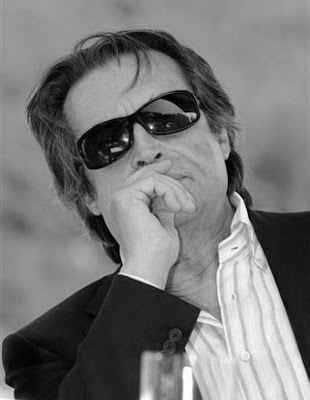
Cosi fan tutte
W. A. Mozart
Fiordiligi - Miah Persson
Dorabella - Isabel Leonard
Ferrando - Topi Lehtipuu
Guglielmo - Florian Boesch
Don Alfonso - Bo Skovhus
Despina - Patricia Petibon
Wiener Philharmoniker & Staatsopernchor
Adam Fischer Musikalische Leitung
Claus Guth Regie
Salzburg, July 30 2009, ORF2 broadcast
W. A. Mozart
Fiordiligi - Miah Persson
Dorabella - Isabel Leonard
Ferrando - Topi Lehtipuu
Guglielmo - Florian Boesch
Don Alfonso - Bo Skovhus
Despina - Patricia Petibon
Wiener Philharmoniker & Staatsopernchor
Adam Fischer Musikalische Leitung
Claus Guth Regie
Salzburg, July 30 2009, ORF2 broadcast



Claus Guth's Cosi, that was performed this summer in Salzburg, is set in a modern house near the woods where Don Giovanni was wandering in last year. The dark atmosphere is pretty similar in both productions but Don Giovanni was a masterpiece - and Cosi is just an accumulation of awkward moments.
The fault is on Guth obviously, who saturated this production with German expressionism, but also on the cast, who was not able - Isabel Leonard excepted - to convey Guth's vision.
But since the singing was overall good, I blame Guth again on that subject - for not simplifying his direction. If your ideas don't work with the cast you have, you must adapt. Mustn't you? The most obvious example lies with Don Alfonso. Guth's idea of Cosi is focused around Don Alfonso - portrayed as Gounod's Méphitophélès from Faust : dark and manipulative.
This concept first lost credibility when he added tons of expressionism - Konwitschny-style.
It then sank when Bo Skovhus was cast for the role - no insult intended, but he's definitely no Erwin Schrott. And I'm pretty sure this production could only have worked with Schrott as Don Alfonso. Well, I suppose this only means you can't be a genius all the time. Better luck next time.


Further reading:
" Au Festival de Salzbourg, un "Cosi" sous hypnose mais peu hypnotique ", Renaud Machart for Le Monde with once again a brilliant review (Aug.8). Chosen extracts: " On pourrait dire que Claus Guth a les idées frappées au coin du nonsense : mais ses excentricités ont toujours un sens, caché ou évident, qui finit par convertir les sceptiques et par le distinguer des metteurs en scène dont l'art du détournement aboutit au cul-de-sac du raccourci abusif. A première vue, ce Cosi est de la même trempe. Il tente de boucler la boucle par des liens récurrents avec les deux autres spectacles salzbourgeois : Eros mène toujours les personnages au doigt et à la braguette ; la forêt de Don Giovanni, lieu de mystère et de sortilèges, est rappelée ; l'escalier monumental des Noces est réinstallé, mais dans une version de l'architecte allemand Mies van der Rohe pour une villa californienne des bords du Pacifique.
(...) Guth a eu l'idée de faire de Don Alfonso un hypnotiseur, vaguement sorcier, un peu John Travolta (mais pourquoi ces mouvements de danse ?), qui claque des doigts, frappe dans les mains (se reprend si cela ne marche pas) et manipule tout le monde.
(...) Cosi, apparemment si simple et si binaire, est pourtant le plus difficile à monter de la trilogie Da Ponte. De très grands, comme Patrice Chéreau, s'y sont même cassé les dents. La lecture de Guth semble plaquée artificiellement sur l'oeuvre, alors qu'elle semblait découler naturellement d'elle dans les deux précédents volets.
(...) En fosse, Adam Fischer (...) souligne adroitement les détails cachés de la partie orchestrale, ménage un cantabile permanent et des tempos sans excès. Tout cela est raisonnable, bien sous tout rapport, mais d'un ennui redoutable."
(...) Guth a eu l'idée de faire de Don Alfonso un hypnotiseur, vaguement sorcier, un peu John Travolta (mais pourquoi ces mouvements de danse ?), qui claque des doigts, frappe dans les mains (se reprend si cela ne marche pas) et manipule tout le monde.
(...) Cosi, apparemment si simple et si binaire, est pourtant le plus difficile à monter de la trilogie Da Ponte. De très grands, comme Patrice Chéreau, s'y sont même cassé les dents. La lecture de Guth semble plaquée artificiellement sur l'oeuvre, alors qu'elle semblait découler naturellement d'elle dans les deux précédents volets.
(...) En fosse, Adam Fischer (...) souligne adroitement les détails cachés de la partie orchestrale, ménage un cantabile permanent et des tempos sans excès. Tout cela est raisonnable, bien sous tout rapport, mais d'un ennui redoutable."

























